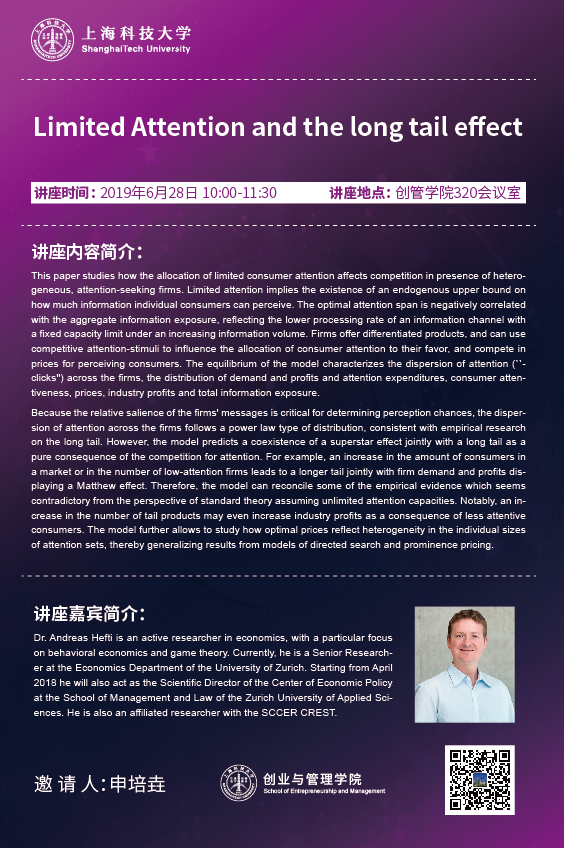Date & Time:June 28, 2019 10:00 - 11:30
Venue:SEM320 Meeting Room
Speaker:Andreas Hefti
Inviter:Peiyao Shen
Abstract:
This paper studies how the allocation of limited consumer attention affects competition in presence of heterogeneous, attention-seeking firms. Limited attention implies the existence of an endogenous upper bound on how much information individual consumers can perceive. The optimal attention span is negatively correlated with the aggregate information exposure, reflecting the lower processing rate of an information channel with a fixed capacity limit under an increasing information volume. Firms offer differentiated products, and can use competitive attention-stimuli to influence the allocation of consumer attention to their favor, and compete in prices for perceiving consumers. The equilibrium of the model characterizes the dispersion of attention (``clicks'') across the firms, the distribution of demand and profits and attention expenditures, consumer attentiveness, prices, industry profits and total information exposure.
Because the relative salience of the firms' messages is critical for determining perception chances, the dispersion of attention across the firms follows a power law type of distribution, consistent with empirical research on the long tail. However, the model predicts a coexistence of a superstar effect jointly with a long tail as a pure consequence of the competition for attention. For example, an increase in the amount of consumers in a market or in the number of low-attention firms leads to a longer tail jointly with firm demand and profits displaying a Matthew effect. Therefore, the model can reconcile some of the empirical evidence which seems contradictory from the perspective of standard theory assuming unlimited attention capacities. Notably, an increase in the number of tail products may even increase industry profits as a consequence of less attentive consumers. The model further allows to study how optimal prices reflect heterogeneity in the individual sizes of attention sets, thereby generalizing results from models of directed search and prominence pricing.
Speaker Biography:
Prof. Andreas Hefti is an active researcher in economics, with a particular focus on behavioral economics and game theory. Currently, he is a Senior Researcher at the Economics Department of the University of Zurich. Starting from April 2018 he will also act as the Scientific Director of the Center of Economic Policy at the School of Management and Law of the Zurich University of Applied Sciences. He is also an affiliated researcher with the SCCER CREST.




